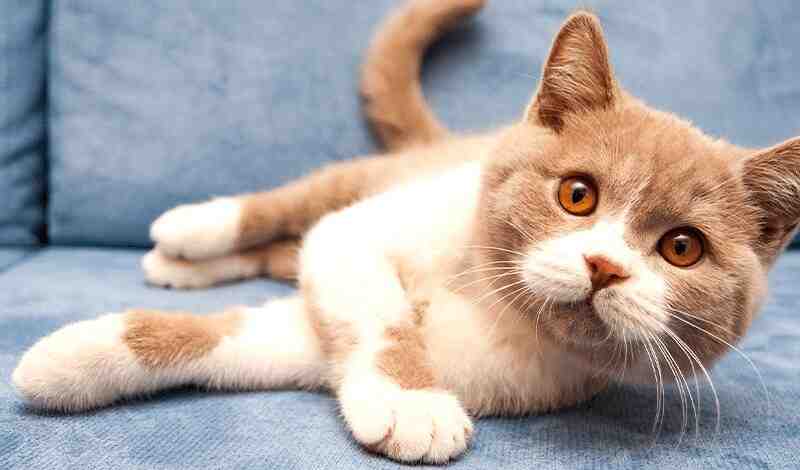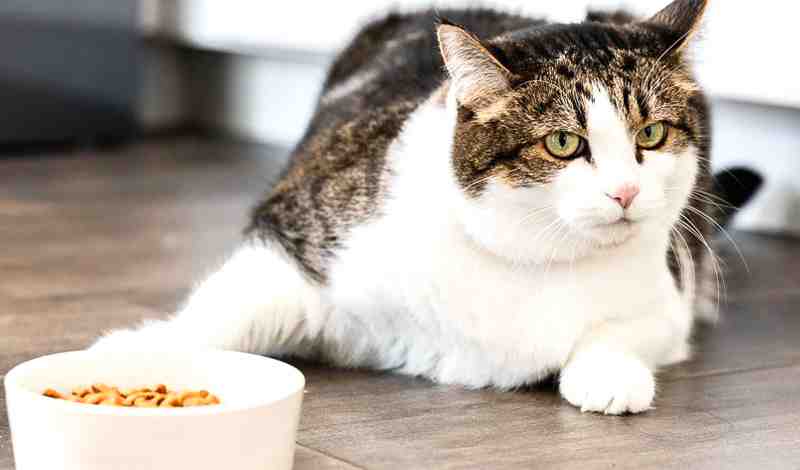Cats are known for their independent and self-sufficient nature. However, when it comes to their dietary needs, they rely heavily on regular meals to thrive.
As responsible cat owners, we must understand the importance of providing our feline companions with proper nutrition. But have you ever wondered, “How long can cats live without food?”
The ability of a cat to survive without food depends on several factors, including its overall health, age, body condition, and access to water.
Generally, a healthy adult cat can survive for approximately one to two weeks without food. However, it’s crucial to note that every cat is unique, and individual circumstances may vary.
In this article, we will delve into this question and explore the factors that affect a cat’s survival without food. So, let’s dive in and learn more about the limits of a cat’s endurance.

Table of Contents
How Long Can Cats Live Without Food?
Cats are obligate carnivores, which means their bodies are adapted to thrive on a diet primarily consisting of meat. However, their survival mechanisms allow them to endure long periods without food compared to some other animals.
Generally, a healthy adult cat can survive for about two weeks without food, but this can vary depending on several factors, including the cat’s overall health, age, and individual metabolism.
It’s important to note that although cats can survive without food for a limited period, it is not recommended to deprive them of nourishment deliberately.
Providing cats with regular meals is crucial to meet their nutritional needs and ensure their well-being.
If you have concerns about your cat’s eating habits or suspect they may be going without food, it’s advisable to consult a veterinarian for proper guidance and support.
Why Is My Cat Not Eating?
There can be various reasons why your cat is not eating. It’s important to monitor their behavior closely and consider the following possibilities:
Illness or Pain
Loss of appetite is often a sign of an underlying health issue. If your cat is not eating and shows other symptoms like lethargy, vomiting, diarrhea, or noticeable weight loss, it could indicate an illness or dental problems. In such cases, it’s crucial to consult a veterinarian for a proper diagnosis and appropriate treatment.
Stress or Anxiety
Cats can experience stress or anxiety due to changes in their environment, such as moving to a new home, introducing a new pet, or disrupting their routine.
These factors can lead to a temporary loss of appetite. Providing a calm and secure environment and giving your cat time to adjust can help alleviate stress-related eating issues.
Food Preferences
Cats can be picky eaters and may refuse to eat certain types or brands of food. It’s possible that your cat doesn’t like the food you’re offering. Experimenting with different flavors or textures of cat food may help you find something that appeals to their taste.
Recent Vaccinations or Medications
Some vaccines or medications can cause temporary appetite loss or gastrointestinal upset in cats. If your cat’s loss of appetite coincides with recent vaccinations or starting a new medication, consult your veterinarian for guidance.
Environmental Factors
Cats are sensitive to their surroundings. Strong odors, dirty food dishes, or an unpleasant feeding area can discourage them from eating. Ensure their feeding area is clean, quiet, and free from distractions or unpleasant smells.
If your cat’s appetite loss persists for more than 24 hours, or if you notice other concerning symptoms, it’s best to seek veterinary advice promptly.
A veterinarian can thoroughly examine and help determine the underlying cause of your cat’s reduced appetite.
Fresh Step Scented Litter with The Power of Febreze, Clumping Cat Litter

What happens if a cat doesn’t eat?
If a cat doesn’t eat, it can lead to various health problems and complications. Cats are obligate carnivores, so their bodies are adapted to obtaining essential nutrients from animal-based proteins.
When a cat doesn’t eat for an extended period can result in hepatic lipidosis or fatty liver disease.
When a cat doesn’t eat, it can experience weight loss, muscle wasting, weakness, and a suppressed immune system.
The lack of essential nutrients and calories can affect various body functions and compromise the cat’s overall health.
If your cat is not eating, it is essential to determine the underlying cause. It could be due to a medical condition, dental problems, stress, or environmental changes.
If your cat refuses to eat for more than 24 hours, it is recommended to consult a veterinarian.
The vet can diagnose the issue and provide appropriate treatment or interventions to address the underlying cause and support the cat’s nutritional needs.
It’s important to ensure that cats have access to a balanced and appropriate diet that meets their nutritional requirements.
If a cat consistently refuses to eat, a veterinarian’s guidance is crucial to identify the reason and find a suitable solution to ensure the cat’s health and well-being.
How can I get my cat to eat?
If your cat is not eating, there are several strategies you can try to encourage them to eat. Here are some tips:
Offer a Variety of Food
Experiment with different types and flavors of cat food, including wet and dry options. Some cats have specific preferences, so providing a range of choices may help stimulate their appetite. You can also try warming the food slightly to enhance its aroma.
Ensure a Quiet and Calm Feeding Environment
Cats can be sensitive to their surroundings, so make sure the feeding area is peaceful and free from stressors. Choose a quiet location away from loud noises, other pets, or any sources of anxiety that could deter your cat from eating.
Try Different Feeding Dishes
Some cats may have preferences for certain types of bowls or dishes. Experiment with different materials, sizes, and shapes to see if it makes a difference. Some cats prefer shallow dishes that don’t touch their whiskers, while others prefer elevated feeding stations.
Hand-Feeding or Interactive Feeding
If your cat is reluctant to eat, try hand-feeding small portions or using interactive feeding toys that dispense food. This can make the feeding process more engaging and appealing to your cat.
Warm Up the Food
Heating canned or wet food slightly can release more aroma, enticing cats. However, ensure that the food is only warmed and not hot, as cats are sensitive to temperature.
Offer Small, Frequent Meals
Instead of presenting one large meal, try offering smaller meals throughout the day. This approach can be especially helpful if your cat has a decreased appetite. Monitor their intake and adjust portion sizes accordingly.
Ensure Fresh Water Availability
Cats should always have access to fresh water. Dehydration can contribute to losing appetite, so ensure your cat’s water bowl is always clean and filled with fresh water.
Consult a veterinarian
If your cat’s appetite loss persists or if they show other concerning symptoms, it’s important to consult a veterinarian. They can thoroughly examine, identify underlying health issues and provide appropriate treatment or guidance.
Remember, if your cat continues to refuse food or shows signs of illness, it’s crucial to seek veterinary advice promptly. A professional can provide personalized recommendations based on your cat’s needs and health status.

How Long Is It Safe For A Cat Not To Eat?
If your cat hasn’t eaten for 15 hours, this is not a long period to wait before you take the animal to the veterinarian. However, if the cat hasn’t eaten longer, do not leave it there.
If your cat has stopped eating and refuses to eat anything you offer, it’s time to act. The first thing to do is take your pet to the veterinarian immediately. Your pet may need treatment right away.
How Many Days Can Cats Go Without Food?
Cats can usually go 7 to 14 days without food but can’t survive more than 3 days without water. While the exact duration can vary depending on factors such as the cat’s health, age, and body condition, it is generally recommended not to let a cat go without food for more than 3 to 5 days.
FAQs
How Long Can A Cat Go Without Food?
While the exact duration can vary depending on various factors, such as the cat’s age, overall health, and body condition, it is generally recommended not to let a cat go without food for more than 24 to 48 hours.
How Long Can A Cat Go Without Eating Before It Becomes Dangerous?
Cats should not go without food for more than 24 to 48 hours. Beyond that, they may develop health issues such as hepatic lipidosis (fatty liver disease).
What Are The Signs That A Cat Is Not Eating?
Signs that a cat is not eating include a loss of appetite, weight loss, lethargy, vomiting, and changes in behavior. If you notice these symptoms, it’s important to consult a veterinarian.
Should I Force-Feed My Cat If It’s Not Eating?
It is not recommended to force-feed a cat. Cats can have underlying health issues that need to be addressed, and forcing food can cause further complications. Consult with a veterinarian for guidance.
What Should I Do If My Cat Is Not Eating?
If your cat is not eating or has a reduced appetite, it’s crucial to consult a veterinarian promptly. They can determine the underlying cause and provide appropriate treatment.
How Can I Encourage My Cat To Eat If It Has A Reduced Appetite?
Your veterinarian may provide specific recommendations based on your cat’s condition. These may include offering different types of food, warming the food slightly, or using appetite stimulants.
Conclusion
While cats have remarkable survival instincts, providing them with regular meals and meeting their nutritional needs is crucial.
A healthy adult cat can typically survive for about one to two weeks without food, but this should not be taken as a recommendation or encouragement to deprive them of sustenance.
Food deprivation can have severe consequences for a cat’s health, and it is important to seek veterinary care if you have concerns about your cat’s appetite or overall well-being.
Remember, responsible cat ownership involves providing proper nutrition and ensuring the well-being of our feline companions.

Hi there! My name is Koushik; I am a cat lover. I specialize in writing about pet care & food. I have a wealth of knowledge on cat food niches and related subjects. I have worked in the pet industry for over 5 years and am passionate about helping cat owners provide the best care for their furry friends. With knowledge of cat food and nutrition, I aim to share their insights and help cat owners navigate the world of cat food niches. I enjoy playing with my two cats, reading, and exploring new cat food brands in my free time.

Understanding how long cats can survive without food is crucial for their health and well-being. Cats can generally go without food for about 1-2 weeks, but this timeframe can vary based on their health, hydration, and body fat reserves. Unlike humans, cats are more sensitive to fasting due to their unique metabolism. Prolonged periods without food can lead to serious health issues, such as liver failure and severe weight loss.
If your cat refuses to eat for more than 24-48 hours, it’s essential to consult a veterinarian immediately. Ensuring your cat has a consistent and balanced diet is key to their overall health and longevity. Regular check-ups and attentive care can help prevent such situations and keep your feline friend happy and healthy.